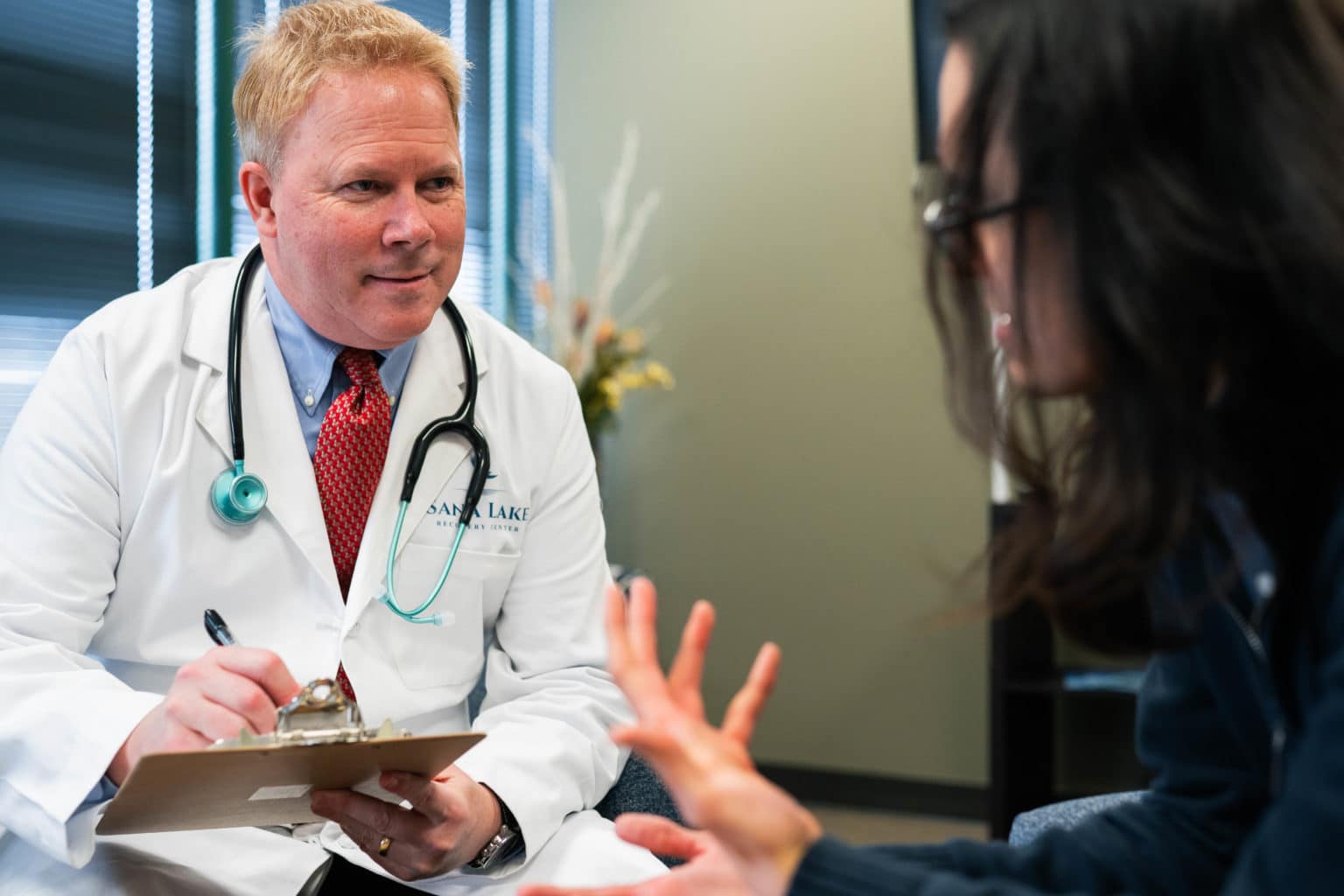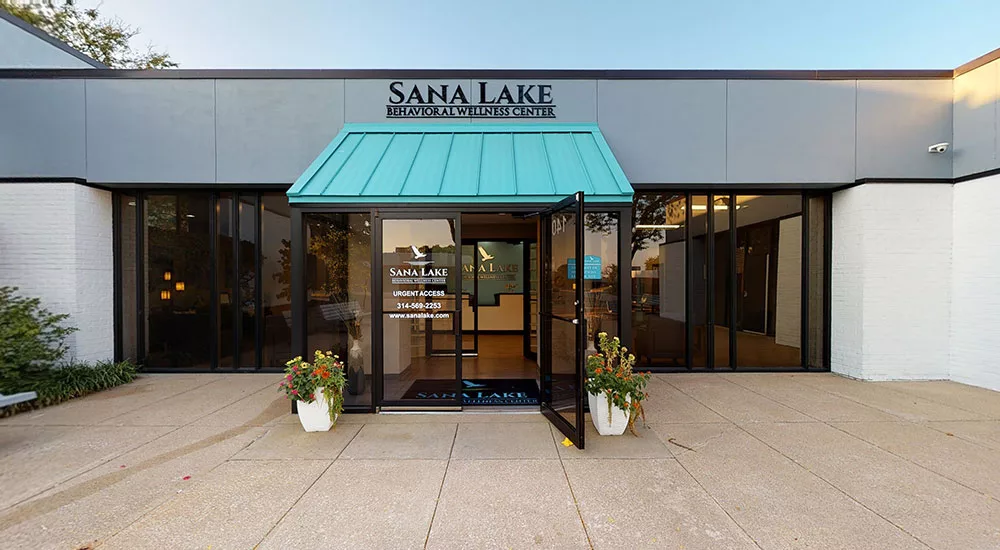Group Therapy for Substance Abuse
How Group Therapy Can Help You Overcome Addiction
For people who suffer from drug and alcohol abuse in Missouri, there are several different types of addiction counseling and support groups with one common goal in mind: sobriety. Every therapy style differs from one another, and each has its pros and cons. Some of these counseling options for addiction treatment include:
- Individual therapy
- Cognitive behavioral therapy (CBT)
- Dialectical behavioral therapy (DBT)
- Family therapy
Our residential and outpatient treatment programs and mental health services are available to help people suffering from addiction and mental illness. Our support group meetings include individual therapy and group therapy for substance abuse to accommodate the needs of people seeking help.

What is Group Therapy?
Group therapy is a type of support group that involves group discussion on various topics about addiction and mental health with other group members and a licensed therapist who can help you overcome your struggles. The idea behind group therapy is to create a community of people who can support and encourage one another through shared experiences.
This type of addiction counseling can be beneficial for anyone, whether you have a strong family support system or are feeling alone in your struggle. Other alternatives to a group therapy setting include:

A type of therapy called cognitive behavioral therapy (CBT) can assist you in managing your issues by altering the way you think and act. Although it can be helpful for other issues with mental and physical health, it is most frequently used to treat depression and anxiety.
Individual therapy is a form of therapy that is spent one on one with a psychotherapist. Individual therapy is useful for a set of personalized sessions that focus on the individual for an allotted amount of time every week. It is recommended that individuals meet with their therapist for a minimum of three months.
Family therapy is a type of therapy that families attend together in a group setting. Addiction can affect the quality of life of everyone in the family, which can cause tension between family members. According to The National Council on Alcoholism and Drug Dependence, drug and alcohol abuse is considered to be an issue for the whole family.
It can be beneficial to go through family therapy together to address all issues surrounding substance abuse and mental health. Most family members aren’t sure how best to help their loved ones. This type of counseling can allow each person involved to voice their concerns and get clarity on how best to support one another.
The Benefits of Group Therapy
There are many benefits to participating in support groups, such as group therapy. You know you have others to count on in your times of need, and seeing people come a long way in their rehabilitation journeys can inspire you on your journey. Spending large amounts of time in a group setting can be a truly inspiring experience. You will get to see individuals you have worked with overcome similar struggles. It becomes more evident that recovery is possible. You realize that it can be done and that there is hope for you. The benefits of group therapy include:
- A supportive environment
- Relapse prevention training
- Hearing from other group members can help you on your journey
- Having a place for people who thrive better with other group members rather than in individual therapy
- Development groups: Helps develop coping skills and life skills
- Makes you feel not alone
What are the Advantages of Group Therapy Over Individual Therapy?
Group therapy offers some specific advantages that make it attractive for both the therapist and the clients being treated. According to scholarly sources, such as The Handbook of Group Counseling and Psychotherapy, these are benefits of individuals working together in groups and do not necessarily indicate that group therapy is superior in any way to individual therapy.
The fundamental goal of group therapy is to initiate a sense of belonging or relatability through understanding, which is achieved by sharing common experiences. For this reason, group therapy is most effective when utilized to address a specific concern common to all group members. Also, group therapy sessions generally tend to be more affordable than individual psychotherapy.
Groups can act as a support network and a sounding board. It fosters the development of communication abilities and social skills and results in individuals being able to learn to accept criticism from other group members. They can help you come up with specific ideas for improving a difficult situation or life challenges and hold you accountable along the way. The benefits of behavioral therapy groups for substance use disorders and mental illness have been proven to produce successful recovery outcomes.
What to Expect During Group Therapy for Substance Abuse
Group therapy is a great opportunity to learn and understand your triggers. Since the others in the group will also be going through a similar recovery process, you can each discuss your struggles and how you are working to overcome them.
During this phase, you may also be given medications to help reduce withdrawal symptoms. This could include medications such as benzodiazepines and antidepressants.
There are a few different kinds of support group meetings within group therapy. The type you should choose should depend on what you feel is most suitable for you personally. Within-group therapy, there are open group sessions and closed group sessions.
Open groups are more readily available to join without much of a waiting period. The downside to them is that, since people are in and out of the group at different times, there may be an adjustment period in forming connections with those in the group with you.
Closed group therapy sessions can take several months to get into since you will first be put on a waiting list to get into them. Closed groups can be beneficial for people seeking addiction treatment because it can be a little bit easier to form those meaningful connections within your development and develop/improve communication skills and build group dynamics that are essential for moving past your addiction.
When deciding what support group is best for you to join, there are several other factors to consider. Do you prefer to have a larger or smaller audience? In a smaller group, you may be able to get more one on one help, whereas a larger group may focus more on the group as a whole. However, if you are in a larger group, there’s likely to be more diversity and wide-ranging topics.
Most group therapy sessions will accept members struggling with any kind of addiction. Substance abuse is very broad, considering there are several different kinds of substances individuals may be addicted to. We provide addiction treatment for some of the following:
Overview of the History of Addiction Therapy
 The earliest form of addiction treatment dates back to Native American tribes. In the early 1750s, they would form sobriety circles, using native healing practices to help with alcohol addictions.
The earliest form of addiction treatment dates back to Native American tribes. In the early 1750s, they would form sobriety circles, using native healing practices to help with alcohol addictions.
In 1864, the New York State Inebriate Asylum, the first addiction treatment center in the United States, opened. Toward the late 1800s, there were a plethora of foreclosures on addiction treatment centers due to causes such as unethical practice and economic depression.
The 1900s were spent researching addiction, re-establishing a plethora of substance abuse treatment centers, and establishing the passage of laws for addiction treatment centers.
During that time, some unethical procedures were still in practice. However, they were not as prominent as in the 1800s. The Emmanuel Movement, which was a form of addiction psychotherapy that had religious foundations, was formed in the early 1900s.
Multiple morphine clinics, as well as narcotics farms, were opened during this time. The opening of Charles B. Towns Hospital and Alcoholics Anonymous were just a few of the addiction treatment centers that opened in the 1900s.
Throughout history, people have struggled with the concept of addiction. Addiction treatment has changed significantly over time. Society has battled with what is morally and ethically correct and what is morally and ethically incorrect. While this is true, it has helped to pave the road for what modern American society knows today as addiction treatment.
Underlying Causes of Addiction
Many individuals suffer from a wide variety of mental illnesses as well as personal issues. It is also not uncommon that they may not even realize they are dealing with a mental illness. In many cases, someone who is struggling with addiction may have been self-medicating that mental illness, and therefore, that is how they developed the addiction. The underlying causes may vary from person to person, and there are a wide variety of co-occurring conditions that may cause addiction. Some of these mental illnesses may be inclusive of:
- Depression
- Anxiety disorders
- Eating disorders
- Personality disorders
- Post-Traumatic Stress Disorder (PTSD)
If left untreated, major physical and psychological complications can occur. At Sana Lake Recovery Center, our inpatient and outpatient addiction treatment programs can help individuals suffering from co-occurring disorders get to the root of their problems and recover successfully.
Co-Occurring Conditions (Dual Diagnosis)
During group therapy for substance abuse, a therapist will help you overcome both your addiction struggles and any underlying mental illnesses you may be struggling with. This concept is commonly referred to as a co-occurring disorder or dual diagnosis. Your therapist is there to help with any issues at all that you may be facing, so you should never feel like your problems are too big to be solved or like you are alone in your battles.


Group Therapy at Sana Lake Can Help!
Here at Sana Lake in Missouri, our addiction specialists are here to help those suffering from addiction through the recovery process. To learn more about how group therapy can help you, contact us today!



